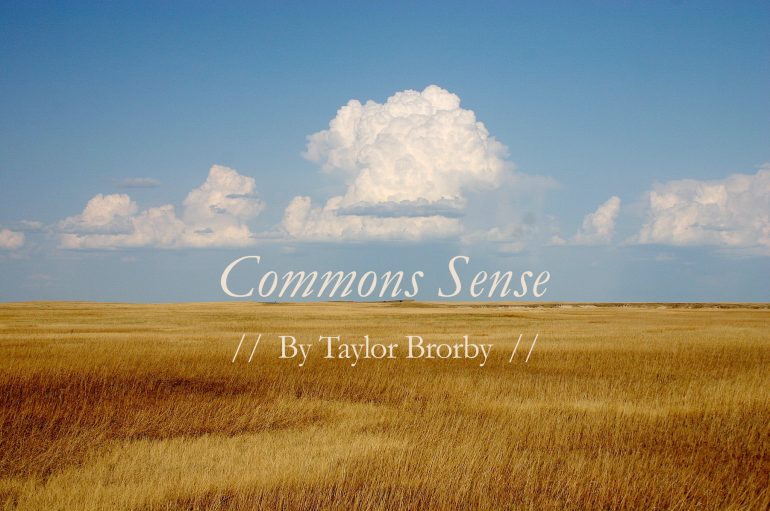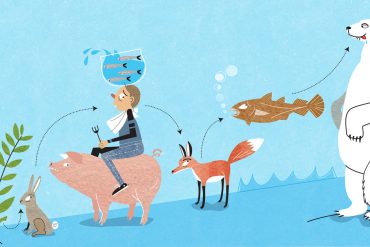Christians like pretty much the same things best: singing, praising, communion, and complacency. In Wendell Berry’s essay “Christianity and the Survival of Creation,” Berry says, “[T]he evangelist has walked beside the conqueror and the merchant, too often blandly assuming that his cause was the same as theirs.”
We need a new Christianity. For generations we, as Christians, have been complacent in our view of the natural world, reaping and sowing for what we assume will be a better tomorrow. We plod along in our ways, relatively inflexible and unchanging, and now it seems we need to grow in our ability to react quickly and with efficiency.
The only thing that’s constant
The earth is warming and changing; this is common knowledge. Over the past 25 years the earth has warmed 1 degree Celsius, effectively winnowing glaciers and the polar ice caps. “According to the UN Environment Programme, the Earth is in the midst of a mass extinction of life. Scientists estimate that 150-200 species of plant, insect, bird and mammal become extinct every 24 hours. This is nearly 1,000 times the “natural” or “background” rate and, say many biologists, is greater than anything the world has experienced since the vanishing of the dinosaurs nearly 65 million years ago.”[ref]John Vidal, Protect nature for world economic security, warns UN biodiversity chief, The Guardian (August, 16 2010)[/ref]
Earlier this year Whole Foods demonstrated how dependent we are upon one single species–the honey bee. At their University Heights location in Rhode Island, Whole Foods had to eliminate 237 of their 453 products–53 percent of what they sell. The honey bee is just one species that we are critically dependent upon. It makes sense, from the assertion that roughly 150-200 species become extinct, that the honey bee may go the way of the dodo bird and that we, too, may very well face our own demise very soon.
A New Epoch: The Anthropocene
In November of 2013 Roy Scranton, an Iraqi war veteran and PhD candidate in English at Princeton, wrote an op-ed in the New York Times called, “Learning How to Die in the Anthropocene.”[ref]Roy Scranton, Learning How to Die in the Anthropocene, The New York Times (November 10, 2013)[/ref] The Anthropocene “represents the idea that we have entered a new epoch in Earth’s geological history, one characterized by the arrival of the human species as a geological force.” The Nobel-Prize-winning chemist Paul Crutzen coined the term in 2002, and it has steadily gained acceptance as evidence has increasingly mounted that the changes wrought by global warming will affect not just the world’s climate and biological diversity, but its very geology — and not just for a few centuries, but for millenniums.
In his article, Scranton writes about the complexity the Anthropocene poses for us in very real terms:
The challenge the Anthropocene poses is a challenge not just to national security, to food and energy markets, or to our “way of life” — though these challenges are all real, profound, and inescapable. The greatest challenge the Anthropocene poses may be to our sense of what it means to be human. Within 100 years — within three to five generations — we will face average temperatures 7 degrees Fahrenheit higher than today, rising seas at least three to 10 feet higher, and worldwide shifts in crop belts, growing seasons and population centers. Within a thousand years, unless we stop emitting greenhouse gases wholesale right now, humans will be living in a climate the Earth hasn’t seen since the Pliocene, three million years ago, when oceans were 75 feet higher than they are today. We face the imminent collapse of the agricultural, shipping and energy networks upon which the global economy depends, a large-scale die-off in the biosphere that’s already well on its way, and our own possible extinction. If homo sapiens (or some genetically modified variant) survives the next millenniums, it will be survival in a world unrecognizably different from the one we have inhabited.
Bill McKibben’s recent book, Oil and Honey, paints a similarly complex picture by focusing solely on plant life. For every degree Celsius that the earth warms, plants must migrate 40 miles farther north. The average tree takes 10 years to move 1 mile farther north. For each degree Celsius the earth warms, it will take plant life 400 years to acclimate to a new climate. With the prospect of the earth warming 2-3 degrees Celsius this century, it means that we will need 800-1,200 years of time for plants to adequately adapt.
While we as Christians believe in the good news, it seems that we are getting anything but good news in what we hear in the media about climate collapse: The Philippines experienced the largest storm in recorded history; New Orleans was crushed by Hurricane Katrina; New York City was ill-prepared for Hurricane Sandy; Colorado was ruined due to intense flooding.
The Book of Job
As we quickly implement new policy and actions–because it is required that we act quickly–we might turn to the book of Job for a lesson in humility. Job is a book about man’s suffering. The Adversary (what some label Satan) and God have a discussion about Job: God boasts to the Adversary about Job’s goodness, but the Adversary argues that Job is only good because God has blessed him abundantly. The Adversary challenges God that, if given permission to punish the man, Job will turn and curse God. God allows the Adversary to torment Job to test this bold claim, but he forbids the Adversary to take Job’s life in the process.
Job, as it is often taught, is about having faith in God during whatever trials come your way.
But Job, perhaps even more than Genesis, is about God’s good creation. And we see that in the questions God asks Job out of the whirlwind: ‘“Where were you when I laid the foundations of the earth? Tell Me, if you have understanding…[W]ho laid its cornerstone, When the morning stars sang together, and all the sons of God shouted for joy?…Have you commanded the morning since your days began, and caused the dawn to know its place?…Do you know the ordinances of the heavens? Can you set their dominion over the earth?”’
The questions in Job continue, and God is unrelenting in God’s unfathomable questions. And these questions, it seems, are still relevant today: they stir in us humility and they give us new eyes to see both the beauty of the planet and the destruction of it.
A New Christianity?
The advent of a new Christianity would bring holiness back to the center of a wholly magnificent planet. We would better learn to live in our places and preach against the desire for complacency and greed. Christianity has a great example in the person of Jesus Christ as a witness towards casting the mighty down from their thrones; Christ’s own approach to civil disobedience might be a practice we consider resurrecting in the Anthropocene.
The facts are not in our favor. The earth is changing and it’s changing quickly. Do we sit back in our Lay-Z-Boys and let our creativity go to waste? Or do we use our skilled mastery in helping replenish and preserve the Earth, like a better translation of Genesis would encourage us to do?
It is a very real fact, like the Bible says, that a person reaps what he sows–and right now we are seeing the fruit of our careless labor and exceeding greed. We have the example of Christ to mark our moral compass, and it behooves us to practice a type of new, radical Christianity, a Christianity that preserves the planet, speaks out for that planet’s environmental justice, and bears witness to the goodness of God’s good creation. For as it says in Leviticus, “The land is mine and you are but aliens and my tenants.
Throughout the country that you hold as a possession, you must provide for the redemption of the land.” It’s our turn to hold up the bargain.





